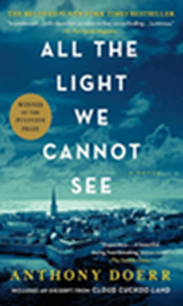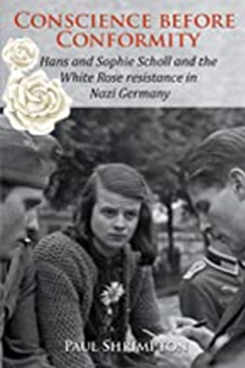all the light we cannot see, by Anthony Doerr The title caught my attention. “All the Light we cannot see” immediately set me thinking of the mystery of God. I knew that the drama series was not going to explicitly approach the mystery of God. Nevertheless, I wondered if anything of what the title evoked for me was to be found in the programme. I decided to take a look. I wasn’t disappointed. This is a short, four-part drama series, recently released in November 2023 currently streaming on Netflix which is based on the The Puliter Prize winning novel of the same name by Anthony Doerr (2014). The story unfolds in the context of World War II, mainly in Occupied France. The two characters we follow most closely are Marie-Laure LeBlanc who is a young French teenager who is blind, and Werner Pfenning who is a German youth serving in Hitler’s Nazi army. Their paths finally cross in the French port of St Malo, at the end of the War. We won’t spoil it for you by saying too much! However, some reflections that might accompany your viewing, concern how Truth and beauty are attributes of God and following on from this the whole of creation is marked by truth and beauty, points to God and communicates something of God. The human spirit is consoled, strengthened and ennobled by truth and can better withstand the onslaught of evil and destruction when it has been formed and tasted truth. Worth watching! We often use language associated with light in order to say something about God. Making a connection between God and light in this way has of course a firm basis in Scripture. The Book of Genesis tells the story of creation and how God created all that is, created light, separated light from darkness, modulated the rhythms of day with night, and the unfolding of seasons. In the New Testament the theme of light is especially developed in the Gospel of St John - which notably "God is light, in him there is no darkness at all". Jesus is "The Light of the World", those who follow Him "walk in the light" (cf. also Is.). Mystics and theologians throughout the centuries have endeavoured to speak of God and have taken up the language of light. God is so knowable, infinitely knowable – no matter how close we come to God, how much we know Him, we could never as it were exhaust the mystery of God. Trish
0 Comments
1/2/2024 book review - conscience before conformity: Hans and Sophie Scholl and The White Rose resistance in Nazi Germany, by paul shrimptonRead NowConscience before Conformity: Hans and Sophie Scholl and The White Rose resistance in Nazi Germany, by Paul Shrimpton (Gracewing). In the midst of Nazi oppression a few young German students had the freedom of thought and courage to speak the truth. They took the name of The White Rose - and with the limited means available to them, especially through printed leaflets, they opposed Hitler and the Third Reich and called on others to offer peaceful determined resistance to the spread of Nazism. Hans and Sophie Scholl along with Christoph Probst were tried and executed by the Nazis in Munich in1943. The story of Hans and Sophie Scholl who were the inspiration and leaders of The White Rose movement has been told many times. However, prior to this book by Paul Shrimpton it seems that a critical aspect had been ignored. No-one had spoken about the reality that Christian faith undergirded and fuelled their daring endeavour: the students and most of those who influenced them were Christians and in particular Catholic. Here at last Shrimpton rectifies this omission. We are introduced to their journey: how they discovered and drank deeply from the thought of great Christian writers such as St Augustine, St Thomas Aquinas, Pascal and St John Henry Newman. These young people changed radically: from being actively involved in the Hitler Youth they stepped out, took up the countercultural dangerous path of resistance to Nazism. Newman and his ‘theology of conscience’ had a remarkable effect on the students and on Sophie in particular. Her conscience was awoken, she regained her freedom and the necessary assurance and courage to resist the draw of evil and live. The White Rose printed leaflets with which they set forth their ideas and denounced Nazism. We might wonder at the power of words: how reading Newman opened a new path for these young people; how the Nazis searched out and tried to silence the authors of these pamphlets. We can learn from the story of The White Rose, draw inspiration from them in our times when we too must choose between conscience and conformity. Then and now, their words speak out and bring hope. Certainly this book is worth reading. Trish |
Details
Archives |
 RSS Feed
RSS Feed